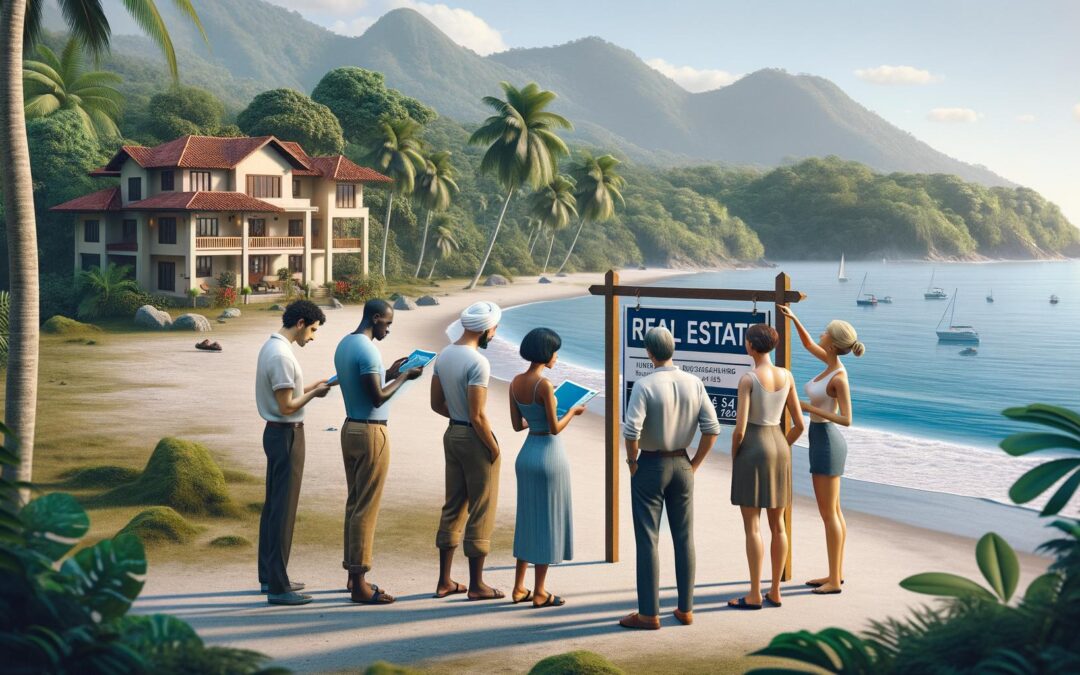At Osa Property Management, we’ve guided countless clients through the process of how to purchase property in Costa Rica. The allure of this tropical paradise has captivated many, but navigating the real estate landscape can be complex for foreigners.
This comprehensive guide will walk you through the legal requirements, essential steps, and financial considerations for buying property in Costa Rica. We’ll share our expertise to help you make informed decisions and turn your dream of owning a piece of paradise into reality.
Legal Requirements for Foreigners Buying Property in Costa Rica
Property Ownership Rights for Non-Residents
Costa Rica’s property laws welcome foreign investors with open arms. While foreigners can readily buy property in Costa Rica, a non-citizen can only own up to 49% of Maritime Zone land. You can buy, sell, and own property without restrictions in most areas of the country.
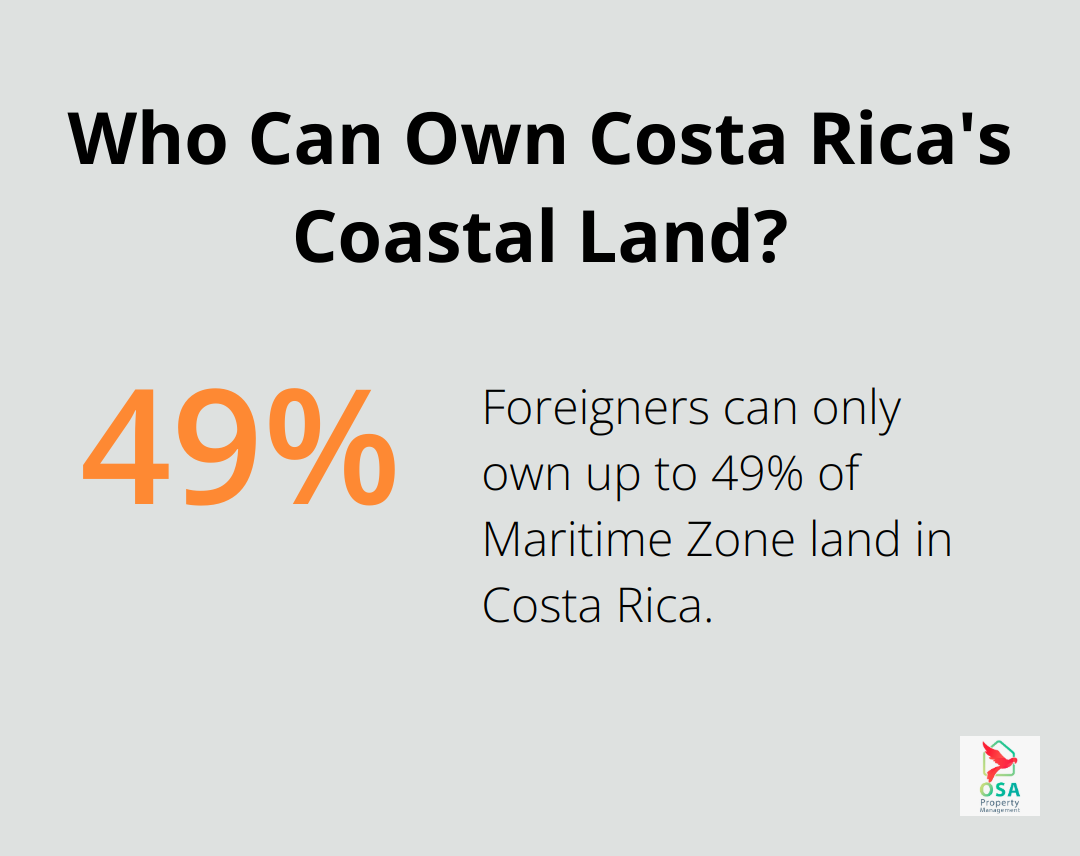
As a foreigner, you have the right to own property in your name or through a Costa Rican corporation. Many investors choose to set up a Sociedad Anónima (SA) or Sociedad de Responsabilidad Limitada (SRL) for tax benefits and easier property management. However, restrictions apply in certain coastal areas known as the Maritime Zone. Within 200 meters of the high tide line, foreigners can only own up to 49% of the property without special concessions.
Essential Documents for Property Purchase
When buying property in Costa Rica, you’ll need several key documents:
- A valid passport
- Proof of funds or financing
- Tax ID number (DIMEX for residents or NITE for non-residents)
- Power of attorney (if not personally present for the transaction)
You’ll also want to obtain a property survey (plano catastrado) and a title study (estudio registral) to verify the property’s boundaries and legal status.
The Important Role of a Lawyer
Hiring an attorney with experience is essential. It’s important to work with someone who is bilingual if you don’t speak Spanish. Your lawyer will:
- Conduct a thorough title search to ensure the property is free of liens and encumbrances
- Draft and review all legal documents
- Represent you during the closing process
- Handle the property transfer and registration with the National Registry
Skilled legal representation leads to smooth transactions. We always advise our clients to work with experienced attorneys who specialize in Costa Rican real estate law.
Navigating the Legal Landscape
While Costa Rica’s property laws generally favor foreigners, the legal system can be complex. Working with professionals who understand both the letter and spirit of Costa Rican law will help ensure a successful and legally sound property purchase.
As you prepare to navigate the legal requirements for buying property in Costa Rica, it’s important to understand the step-by-step process involved. Let’s explore the practical steps you’ll need to take to turn your Costa Rican property dreams into reality.
Steps to Buying Property in Costa Rica
Research Your Ideal Location
Start your property search by exploring different regions of Costa Rica. Each area offers unique benefits, from the vibrant city life in San José to the tranquil beaches of Guanacaste. Consider factors like climate, infrastructure, and proximity to amenities. Visit potential locations during different seasons to get a comprehensive feel for the area.
Find a Trustworthy Real Estate Agent
A reputable agent will help you navigate Costa Rica’s property market. Look for agents registered with the Costa Rica Global Association of Realtors (CRGAR) or the Costa Rica Chamber of Real Estate Brokers Board. These organizations ensure their members adhere to professional standards (which is essential for a smooth transaction).
Conduct Thorough Due Diligence
After you find a property, it’s time for due diligence. This includes:
- Property inspection: Hire a professional to assess the structural integrity, especially in areas prone to heavy rainfall.
- Title search: Your lawyer should conduct a comprehensive title search to confirm legal ownership and any encumbrances.
- Zoning verification: Ensure the property’s zoning aligns with your intended use.
- Environmental considerations: Check for any environmental restrictions, particularly in coastal areas.
Negotiate and Make an Offer
With due diligence complete, you can make an offer. Your real estate agent will help you negotiate terms. In Costa Rica, it’s common to start with a verbal offer, followed by a written offer if accepted. Prepare for some back-and-forth negotiation.
Close the Deal
Once you agree on terms, sign a purchase agreement and typically pay an earnest money deposit. Your lawyer will then prepare the final deed (escritura). On closing day, you’ll sign the deed, pay the remaining balance, and receive the keys to your new property.
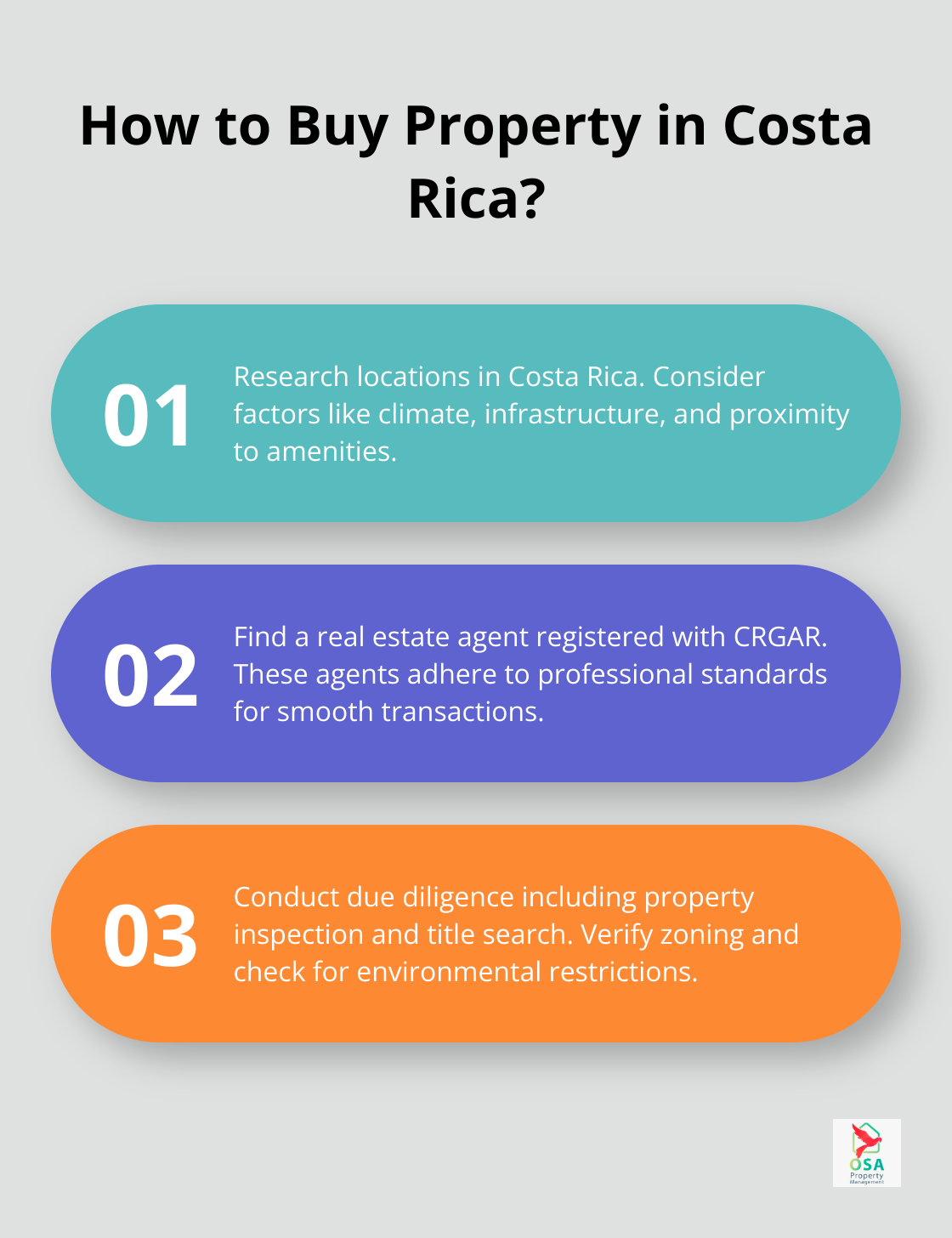
While the process might seem straightforward, local nuances can complicate matters. That’s why working with experienced professionals is important. As you move forward with your property purchase, it’s essential to consider the financial aspects of this investment. Let’s explore the financial considerations that come with buying property in Costa Rica.
Financial Aspects of Buying Property in Costa Rica
Property Taxes and Fees
Costa Rica’s property tax system offers favorable conditions for property owners. The tax rate is on a sliding scale, ranging from 0.25% to 0.55% of the registered property value. This tax is in addition to the annual property tax of 0.25%. For instance, a property valued at $200,000 incurs only $500 per year in property taxes. This low rate makes Costa Rica an attractive option for long-term property investment.
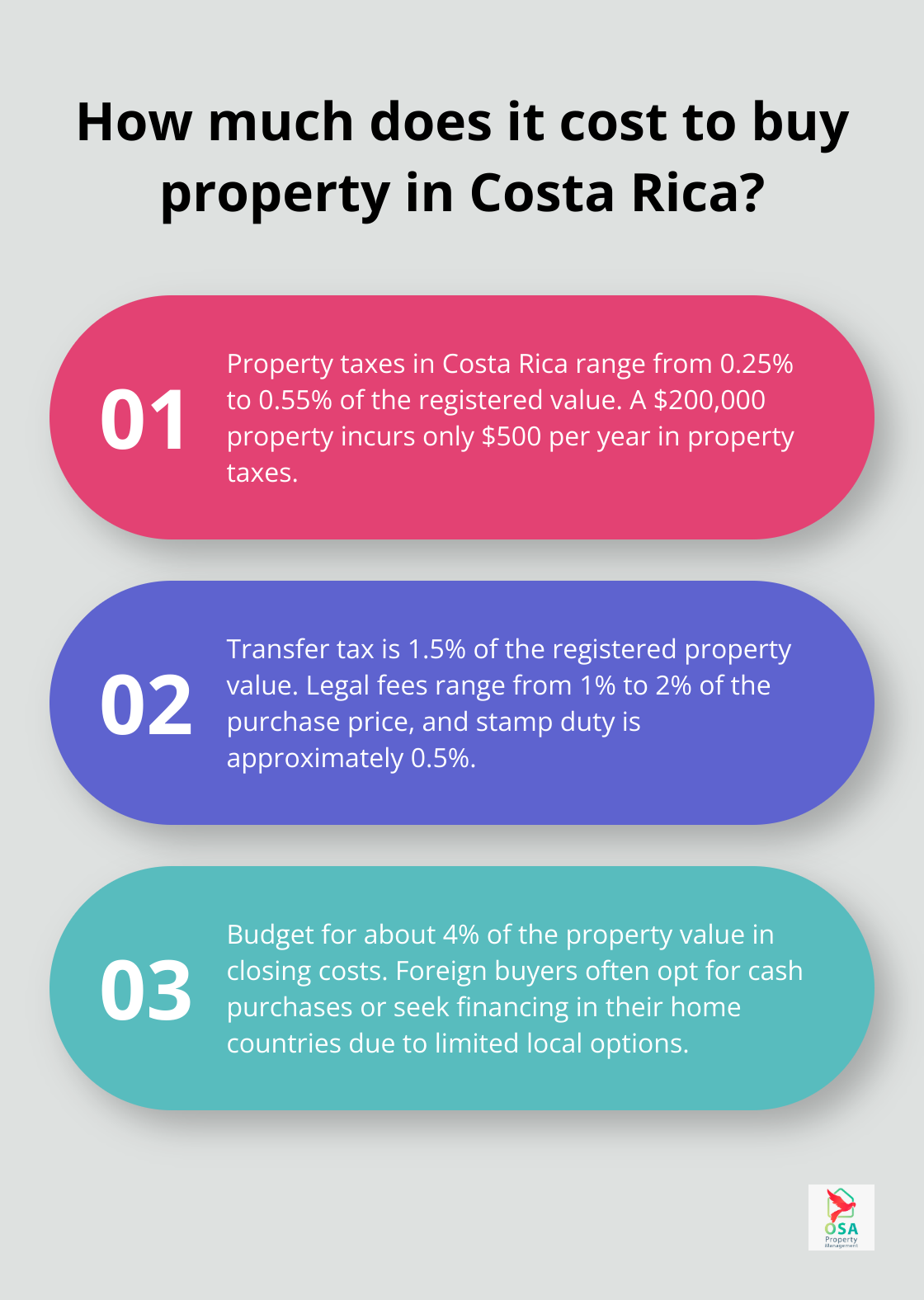
Additional costs to consider include:
- Transfer tax: 1.5% of the registered property value (paid at purchase)
- Legal fees: 1% to 2% of the purchase price
- Stamp duty: approximately 0.5%
Budget for about 4% of the property value in closing costs to cover these expenses.
Financing Options
Foreign buyers in Costa Rica face limited financing options. Local banks typically require residency status for mortgage approval (a process that can take considerable time). Many foreign buyers opt for cash purchases or seek financing in their home countries.
Some developers offer in-house financing options as an alternative. These often come with higher interest rates than traditional mortgages but can prove easier to obtain for non-residents.
Currency Exchange Management
Currency fluctuations can significantly impact property investments. While many high-end properties in Costa Rica list prices in US dollars, it’s important to consider exchange rates when bringing funds from another currency.
Working with a reputable currency exchange service can help you obtain the best rates and minimize transfer fees. Some property buyers have saved thousands of dollars by timing their transfers strategically and using specialized forex services instead of traditional banks.
Rental Income Potential
The robust tourism industry in Costa Rica creates ample opportunities for short-term rentals, especially in popular areas like Manuel Antonio or Tamarindo. According to the Costa Rica Tourism Board, statistical data on international arrivals is available, with variations and graphic comparisons of six-month periods compared to the previous year, including data for 2019.
Well-located properties can achieve occupancy rates of 60-70% during high season, with nightly rates ranging from $100 to $500 or more (depending on the property type and location).
Factor in management costs, maintenance, and periods of low occupancy when calculating potential returns. Professional property management services (like those offered by Osa Property Management) can provide detailed projections to help make informed decisions about rental property investments.
Final Thoughts
Purchasing property in Costa Rica offers a unique opportunity to own a slice of paradise. The process requires careful planning and expert guidance to navigate legal requirements and financial considerations. We at Osa Property Management have helped numerous clients understand how to purchase property in Costa Rica, from researching locations to closing deals.
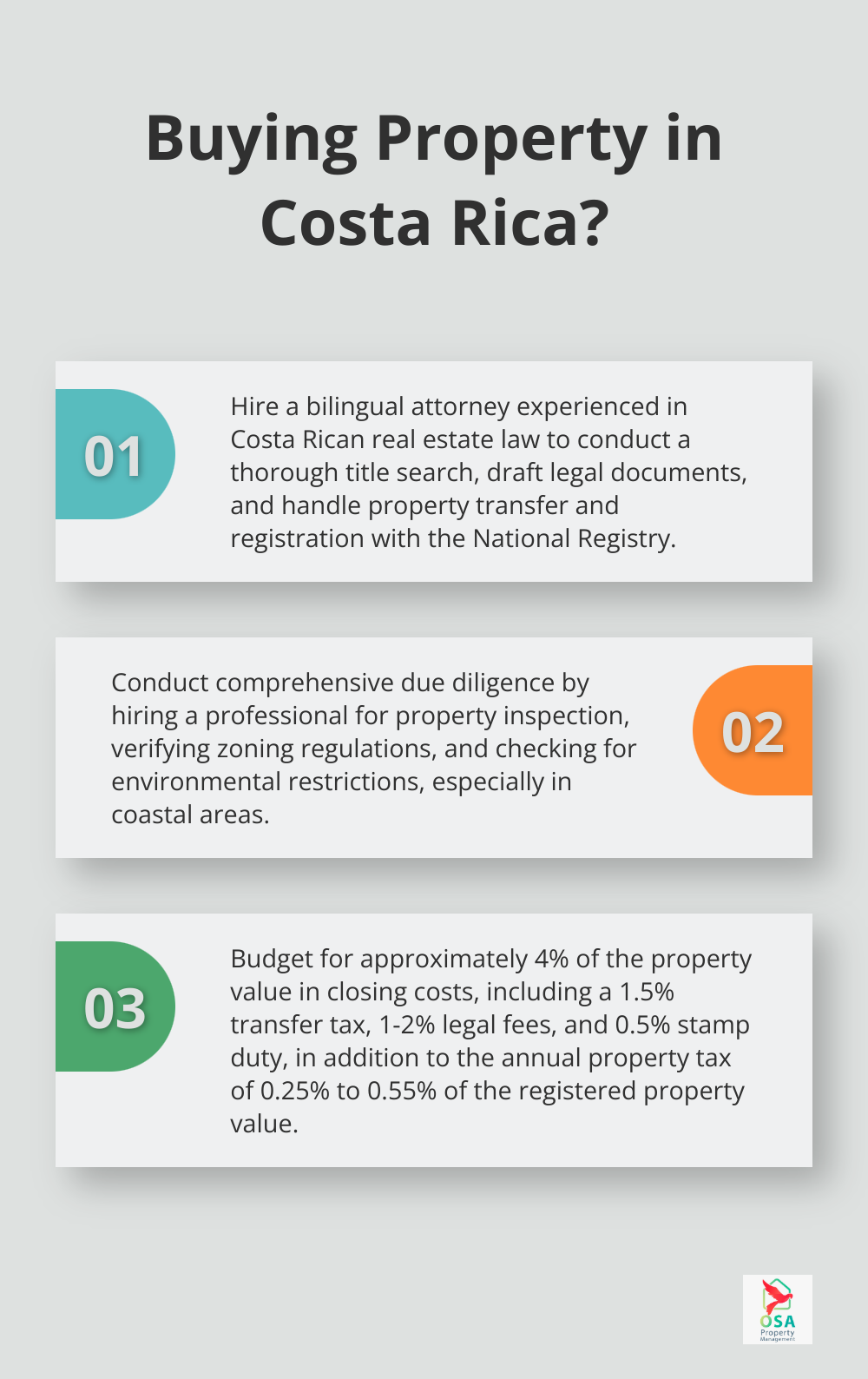
Professional guidance proves indispensable when buying property in Costa Rica. Experienced lawyers, real estate agents, and property managers ensure smooth transactions and help avoid potential pitfalls. Osa Property Management specializes in comprehensive property management services, offering peace of mind to homeowners and investors.
The rewards of owning property in Costa Rica extend beyond financial considerations. From stunning natural beauty to a laid-back lifestyle, Costa Rica presents diverse options to suit various preferences and budgets. With the right approach and expert support, you can turn your dream of owning a piece of this tropical paradise into a rewarding reality.

